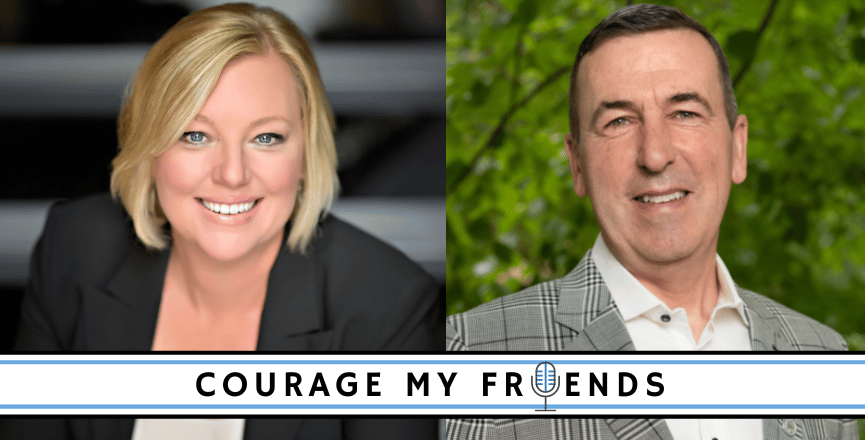
COP15, and 30x30 Pt.I: Turning the Tide on Biodiversity Loss and Mass Extinction
 2023-01-16
2023-01-16
In this two-part episode of the Courage My Friends podcast, Tim Gray, executive director of Environmental Defence and Sandra Schwartz, national executive director of the Canadian Parks and Wilderness Society (CPAWS) discuss the crisis of biodiversity loss and mass extinction, Canada’s commitments under the Kunming-Montreal agreement coming out of the global COP15 gathering on biodiversity, and challenges and strategies toward meeting this very ambitious and even more necessary target.
According to Schwartz: the UN has reported recently,.. that around a million animal and plant species are now threatened with extinction. And that is really within a few decades. That's more than ever before in human history. And that's largely a result of human interaction with nature. So whether that is from exploration, from mining for example, forestry, …clearly we need to act now to save the natural world, because it is sustaining us as humans.
Speaking to the recent Kunming-Montreal Global Biodiversity Framework, Schwartz says: [I]t was a huge win, both for people, but also for the planet. .. Target Three of the framework is requiring the protection of at least 30% of land and ocean is protected globally by 2030…a requirement that Indigenous rights are respected and that Indigenous territories are recognized…And, all together the goals and targets of the agreement really do present a comprehensive plan to protect and restore biodiversity. But it's ambitious. And really, from our perspective going into the conference, what we were most holding out hope for was that the Framework Agreement would be ambitious.
Reflecting on proposed development on the Ontario Greenbelt, Gray says: 70% of the lands to be removed, is in something called Dufferin's Rouge Agricultural Preserve. It was both part of the Greenbelt, but also had its own separate protective legislation, which was removed by Bill-39 at the same time that Bill-32 was going through…This was formally publicly-owned land, sold to the farm community with legal easements to keep it as farmland forever, which have now been removed and open for development. So threats both to forest and wetland systems that are associated with the National Park, contrary to Indigenous rights and Indigenous opposition, threatens the viability of farming in that area. ..And so the viability of the farm community is threatened, major river systems, federally listed species at risk, fisheries habitat, migratory birds. The list is very, very long.
In terms of the implementation of global agreements, Gray says: [O]ne of the real challenges that we face is that, even as we sign international agreements that commit to stopping loss, increasing protection, advancing restoration to address biodiversity loss is that we see, like in particular in Ontario right now, a massive race in the opposite direction with dismantling of protection regimes for woodlands, wetlands, massive encouragement of sprawl development at the expense of building denser cities with transit, etc. So it is a real challenge to see the most populist, most wealthy province with a huge amount of the the biodiversity that this country holds, literally racing in the direction of further destruction
About today’s guests
Tim Gray is the executive director of Environmental Defence. Gray has over 25 years experience developing and implementing environmental policy change efforts. These have included major shifts in land conservation, forest practices and climate change. Starting out his career as a biologist and policy analyst, Gray has spent a lot of time learning skills that move complex environmental issues toward resolution. He has worked with other change makers on the front lines of conflict and has also taken his skills inside to work on government advisory committees and in complex negotiations with industry. Gray completed an H.BSc. at Wilfrid Laurier University and a M.Sc. at the University of Toronto.
Sandra Schwartz is the national executive director of the Canadian Parks and Wilderness Society. With master’s degrees in management, and environmental studies and over 20 years of experience, she is a strong advocate for sound environmental policy and has championed progressive ideas for clean energy and tackling climate change.
Transcript of this episode can be accessed at georgebrown.ca/TommyDouglasInstitute.
Image: Sandra Schwartz and Tim Gray / Used with Permission
Music: Ang Kahora. Lynne, Bjorn. Rights Purchased
Intro Voices: Ashley Booth (Podcast Announcer); Bob Luker (voice of Tommy Douglas); Kenneth Okoro, Liz Campos Rico, Tsz Wing Chau (Street Voices)
Courage My Friends Podcast Organizing Committee: Chandra Budhu, Ashley Booth, Resh Budhu.
Produced by: Resh Budhu, Tommy Douglas Institute and Breanne Doyle, rabble.ca
Host: Resh Budhu
More Episodes
 2014-10-07
2014-10-07
 2014-10-02
2014-10-02
 2014-09-16
2014-09-16
 2014-08-19
2014-08-19
 2014-08-18
2014-08-18
 2014-07-31
2014-07-31
 2014-07-07
2014-07-07
 2014-05-19
2014-05-19
 2014-05-01
2014-05-01
 2014-04-05
2014-04-05
 2014-03-28
2014-03-28
Create your
podcast in
minutes
- Full-featured podcast site
- Unlimited storage and bandwidth
- Comprehensive podcast stats
- Distribute to Apple Podcasts, Spotify, and more
- Make money with your podcast
It is Free
- Privacy Policy
- Cookie Policy
- Terms of Use
- Consent Preferences
- Copyright © 2015-2024 Podbean.com





